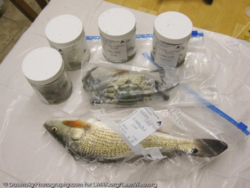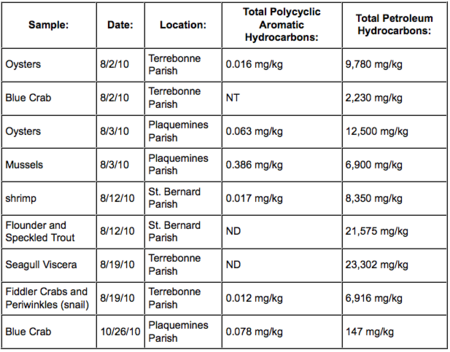Is Gulf seafood really safe to eat?
 Independent testing has turned up oil contamination in Gulf seafood, raising concerns that federal officials prematurely pronounced it OK to eat.
Independent testing has turned up oil contamination in Gulf seafood, raising concerns that federal officials prematurely pronounced it OK to eat.The Lower Mississippi Riverkeeper (LMRK) has released results from seafood sampling trips conducted along a broad area of the Louisiana coast since August. The results show significant levels of petroleum in a number of species -- though the contamination was not apparent by sight or smell.
For examples, levels of total petroleum hydrocarbons in flounder and speckled trout caught in St. Bernard Parish on Aug. 12 were 21,575 milligrams per kilogram, while oysters caught in Plaquemines Parish on Aug. 3 showed levels at 12,500 mg/kg. Petroleum levels found in fiddler crabs and periwinkles harvested from Terrebonne Parish on Aug. 19 were 6,916 mg/kg.
"The high levels of petroleum hydrocarbons are troubling particularly since many of these species are consumed by people," the LMRK said in a press release. "It is our understanding that there should be no detectable levels of petroleum hydrocarbons in seafood."
LMRK noted that the seafood species appeared "pristine" and did not look or smell suspicious.
The group's sampling also showed that the oil contamination is moving up the food chain, with levels of total petroleum hydrocarbons in seagull guts collected from Terrebonne Parish on Aug. 19 at 23,302 mg/kg. This LMRK chart shows the latest sampling results in full (click on chart for a larger version):
 Meanwhile, a Louisiana law firm representing several environmental and fisheries groups including the United Commercial Fishermen's Association say its own sampling of Gulf seafood contradicts the federal government's claims that it is safe to eat. The tests looked at a range of hydrocarbons for which federal agencies are not testing for, and which can impact liver and kidney function.
Meanwhile, a Louisiana law firm representing several environmental and fisheries groups including the United Commercial Fishermen's Association say its own sampling of Gulf seafood contradicts the federal government's claims that it is safe to eat. The tests looked at a range of hydrocarbons for which federal agencies are not testing for, and which can impact liver and kidney function."The gap [in testing] is rather serious," toxicologist William Sawyer told New Orleans' Gambit Weekly. "The hydrocarbons ... have almost no volatility. They can't be detected by nose, not even by a bloodhound."
Late last month, the National Oceanic and Atmospheric Administration closed over 4,200 square miles of Gulf waters to royal red shrimp fishing after some fishermen collected tar balls in their nets and others caught oiled shrimp. The announcement came just days before the White House shipped 2,000 pounds of Gulf shrimp and crabs to serve at holiday parties in the latest effort to boost consumer confidence in the region's seafood.
An estimated 172 million gallons of oil spilled into the Gulf of Mexico from BP's failed Deepwater Horizon drilling rig between April and July.
(Photo by Jeffrey Dubinsky for Lower Mississippi Riverkeeper.)
Tags
Sue Sturgis
Sue is the former editorial director of Facing South and the Institute for Southern Studies.
